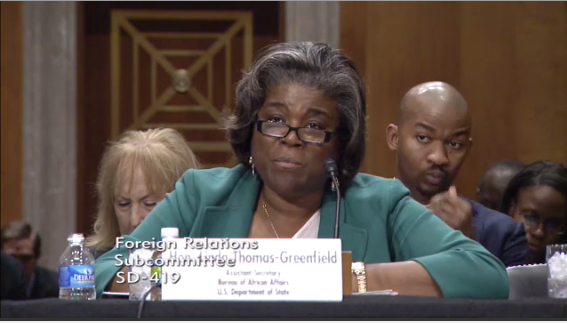Linda Thomas-Greenfield, U.S. Assistant Secretary of State for African Affairs, told the Senators that she had read the UNHCR reports on Rwandan government conscription of Burundian refugees for combat in Burundi and that she found them credible.
Burundian insurgents attacked three army bases early Friday morning, 12.11.2015, but the Burundian army prevailed and reported that it had killed at least a dozen of the attackers and taken at least 21 more prisoners, according to Agence France Presse. Fighting continued through the night and the dead in Burundi’s streets were estimated to be as high as 89 on Saturday morning. The government and opposition told conflicting stories about who the dead were and how they died.
Two days before the latest attacks, a U.S. Senate Foreign Relations subcommittee held a hearing on the situation in Burundi. Arizona Sen. Jeff Flake, Massachusetts Sen. Ed Markey. Maryland Sen. Ben Cardin and Delaware Sen. Chris Coons asked how mass violence, particularly mass violence between Hutus and Tutsis, could be avoided. Linda Thomas-Greenfield, assistant secretary of state for African affairs, assured them that the conflict remains fundamentally political, not ethnic, though conflicts in Rwanda and Burundi always have ethnic undertones and raise fears of ethnic violence.
Sen. Flake asked how the struggle between government and opposition could be stopped, given that neither side is willing to compromise on President Nkurunziza’s third term. He also asked whether the East African Community (EAC) could press for a resolution. “As you know,” he said, “some of the coalition of opposition leaders there have made it clear that no peace will be possible as long as Nkurunziza remains in power. He has no intention, it seems, of stepping down. What’s gonna give? And, first, is it just who blinks here? Or is there going to be pressure from the EAC and others that break the logjam?”
Linda Thomas-Greenfield responded with vague statements about dialogue and bringing both sides to the table, but without identifying any possible points of compromise. She also said that the East African Community is divided, that Tanzania has issues with Rwanda, not Burundi, and that Uganda’s President Museveni is busy with his own re-election campaign. Sen. Flake noted that President Museveni, the EAC’s designated mediator, lacked credibility as an advocate for presidential term limits, given that he himself has been in power for 30 years and is now seeking re-election.
Sen. Flake also asked about
reports that the Rwandan government is conscripting Burundian refugees in Rwanda to create a new “rebel army” to fight in Burundi. Thomas-Greenfield responded that these reports are credible. “There’ve been reports that the Rwandan government is secretly recruiting an army of Burundian refugees, presumably for the purpose of conducting some kind of armed insurgency inside Burundi. There was a letter to the editor in the Washington Post in November, written by Jeff Drumtra, a former U.N. official who outlines this, what he saw there in those camps. If these reports are true, what is the State Department doing to press the Rwandan government from doing this?”
Linda Thomas-Greenfield responded, “Sir, we’ve seen these reports and we have had a number of conversations with the Rwandan government to encourage them to investigate the reports, and any efforts that are being made within refugee camps in the borders of Rwanda should be stopped. We’ve also had discussions with them to discourage any actions taken by the Rwandan government to support additional violence that might take place in the region.”
Sen. Flake then asked whether she herself put stock in these reports.
Thomas Greenfield responded, “I have seen reports coming from UNHCR. We work closely with UNHCR, and I trust that if they are reporting this, they have seen the basis for making these reports and allegations.”
The U.S. has imposed sanctions on two members of the Burundian government and two members of the Burundian insurgency, but has not imposed sanctions on Rwanda for violating Burundi’s national sovereignty. Rwanda continues to deny creating a Burundian “rebel army.” Rwanda also continues to deny creating “rebel armies,” most recently M23, to fight in the eastern Democratic Republic of the Congo.
Sixte Vigny Nimuraba, a Burundian Ph.D. student at George Mason University, told the Senators that the conflict is between Burundi’s political classes in Bujumbura, not the rural majority, and noted the resource competition between East and West. “It is widely agreed that Burundian people need peace. People in the countryside do not care about presidents’ terms or nuances of constitutional law. What some people want is economic support, such as chemical fertilizers or seeds. Others want jobs and equal opportunities. The capital city is the place where the political classes live. That may be the reason why there is violence there now, and that has a lot to do with our own history.”
“Current government leaders see Western countries as denying the principles of democracy and sovereignty of Burundi,” he continued. “There is an underreported cold war competition between two major powers, China and Russia on one side and the West on the other. Unexploited mineral resources like nickel and uranium play a major role in that commercial conflict.”
Nimuraba also said that after 20 years of war, many Burundians suffer from post-traumatic stress disorder, and a national trauma healing program, including nonviolence training, is needed.
NGO Refugees International published this report confirming Rwanda’s forced conscription of Burundian refugees: ASYLUM BETRAYED: RECRUITMENT OF BURUNDIAN REFUGEES IN RWANDA.
Oakland writer Ann Garrison contributes to the San Francisco Bay View, Black Agenda Report, Black Star News, Counterpunch, Global Research, and her own website, Ann Garrison, and produces for AfrobeatRadio on WBAI-NYC, KPFA Evening News, KPFA Flashpoints and for her own YouTube Channel, AnnieGetYourGang. She can be reached at [email protected]. In March 2014 she was awarded the Victoire Ingabire Umuhoza Democracy and Peace Prize for promoting peace in the Great Lakes Region of Africa through her reporting.







